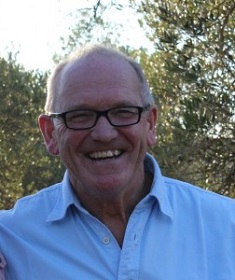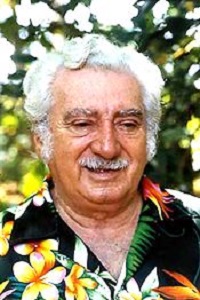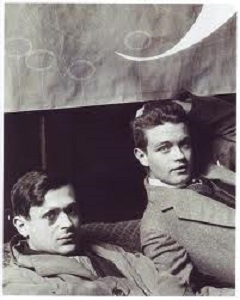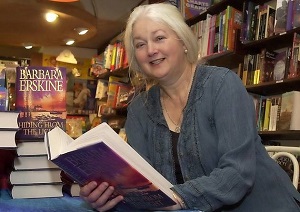|
De Britse schrijver Robin Pilcher werd geboren op 10 augustus 1950 in Dundee. Zie alle tags voor Robin Pilcher op dit blog en ook mijn blog van 10 augustus 2010
Uit: Starburst
“That had been enough for Tess. The thought of "other places" had cut any notion of romantic frivolity from her mind.
Seated on the edge of the bed, Tess pulled on her brown leather calf-length boots, wrestled the legs of her jeans over them, and then got up and walked over to open the wooden shutters on one of the room's tall sash-framed windows. Her spirits, which had been flying at Learjet height since the wedding, sank a little when she looked out onto another grey day in the Scottish capital. She could tell by the movement of the leafless trees just visible up by Heriot Row and by the way the pedestrians on the pavement below walked up Dundas Street clutching their coats closed at the neck, that the wind was coming from the north, sweeping cold and unguarded across the Firth of Forth. Spring is a season that's lost its reason, she thought to herself. The beginning of May and it could as well be February. An icy draught sought out a space at the side of the ancient window frame, surrounding her with a chill that made her shiver and clasp her hands under her armpits. It was about the one thing, being married, that she regretted, having to leave her cosy little tenement block flat in West College Street and move here to Allan's great barn of a place, situated in the infinitely smarter New Town.
Tess picked up her mobile from the bedside table and thumbed a couple of buttons. She held it to her ear as she pulled on her woollen jacket and shouldered the strap of her laptop case. When Allan eventually answered, his greeting was unintelligible through a mouthful of food.
"It's me," Tess said, picking up her keys from the table in the hallway.
She heard Allan swallow. "I know. Your name came up. Sex Maniac."
"It does not say that!"
"No, you're right. It says Mrs. Goodwin."

Robin Pilcher (Dundee, 10 augustus 1950)
De Braziliaanse schrijver Jorge Amado de Faria werd op 10 augustus 1912 geboren in Ferradas, in de gemeente Itabuna. Zie ook alle tags voorJorge Amado op dit blog en ook mijn blog van 10 augustus 2010
Uit: The War Of The Saints (Vertaald door Gregory Rabassa)
“They had been trustworthy vows, those of the captain and his wife, yet the old nun, huddled in her worn and severe habit, trembled for the safety of the figure throughout the long voyage, because of the river currents or the rough seas of the gulf. But she didn't say a word, didn't let her concern show; only prayed, reciting over and over the beads of her rosary, until the breeze that fluttered about the carving came to comfort her bony hands. For her the trip was long and worrisome; she breathed easily only when the sloop headed in toward the market ramp. All had gone well, God be praised! she thought. The saint and her sack of thunder and lightning would soon be in the Museum of Sacred Art, where the director, a German monk with several advanced degrees, a scholar three times over, a renowned author, in his impeccable white cassock, awaited her impatiently. He'd developed a breathtakingly daring thesis concerning the origin and the artist of this famed piece of religious sculpture. Only then, delivered from her prison of fear, would Sister Maria Eunice close her eyes, let out a sigh of relief, and succumb at last to the soft enveloping breeze.
The priest, for his part, didn't look like a priest–how could anyone recognize him as a father when he was wearing blue jeans and a flowered shirt open to the wind, with no tonsure shaved into the center of his flowing hair? He was a good-looking fellow who drew women's stares. The habit doesn't make the monk, teaches a wise proverb that dates back quite a bit, to a time before such changes in costume and custom were common. In spite of the apparent disorder in his clothes and hair, his lack of cassock and tonsure, this was no hippie on his way to the peace and love colony in Arembepe, but an ordained priest, sincere in his vocation and his apostolate, devoted to his mission. In the distant parish that was his charge, the faithful were God's unfortunates, slaves of the rich, humbled by the age-old law of violence.
For him the trip had seemed longer, endless even, because he'd been living amid impunity and injustice and had every reason to believe he was being summoned to the capital for something besides praise or encouragement. He'd heard of provocations and threats, he'd read items in the papers denouncing and condemning the subversive activity of certain priests. His name, Father Abelardo Galvão, had appeared in the press, in twisted stories that turned facts upside down, invented things, slung mud, vilified him.”

Jorge Amado (10 augustus 1912 – 6 augustus 2001)
De Franse dichter en schrijver René Crevel werd geboren op 10 augustus 1900 in Parijs. Zie ook alle tags voor René Crevel op dit blogen ook mijn blog van 10 augustus 2010
Uit: Babylone
« Une petite fille interroge : « Qu’est-ce que la mort ? » mais, sans laisser le temps d’une réponse, déjà prévient:
Et surtout, puisque tu prétends que tout le monde meurt, il ne faut pas essayer de me faire croire que c’est comme quand on dort. Ceux qui s’amusent n’ont jamais sommeil…
D’une famille qui ne boit que de l’eau, se méfie des effets du poivre, a proscrit de sa table la sauce anglaise, les pickles et même la moutarde, mais, volontiers, entre la poire et le fromage, parle d’hygiène sociale, la mère, résignée, dès le seuil de la trentaine, à la plus grise, la plus inutile des vertus, constate :
— Ceux qui s’amusent ont beau n’avoir jamais sommeil, ils n’en meurent pas moins, tout comme les autres. Nul, d’entre les hommes, n’échappe à la loi fatale, car mon enfant, la mort… la mort…
— Ah oui, je comprends. La mort, elle ressemble à cousine Cynthia. Cynthia, même avant de la connaître, je ne pensais qu’à elle. D’ailleurs, à la maison, à tous les repas, on en parlait. On était si impatient de la voir, et grand-mère répétait : « Cynthia, ce sera notre rayon de soleil ». Alors quelle joie, le jour de son arrivée. Elle apportait des gentils cadeaux pour chacun et, avec ses cheveux rouges, sa robe verte et ses yeux gris comme les nuages, on devinait tout de suite qu’elle était née dans un pays où toi, tu n’iras jamais. On l’avait installée dans la plus jolie chambre, et elle aurait pu y rester des années et des années, mais, un beau jour, plus de Cynthia. Elle avait filé sans rien dire. Comme une voleuse. En partant, elle avait emmené papa. D’abord, j’ai cru que c’était pour rire, mais ils ne sont pas revenus. Grand-mère, comme toujours, fait la fière, dit qu’il ne faut pas les regretter et qu’il n’y a qu’à les laisser courir la prétentaine.»

René Crevel (10 augustus 1900 – 18 juni 1935)
Man Ray, Tristan Tzara en Rene Crevel, 1928
De Peruaanse dichteres Blanca Leonor Varela Gonzáles werd geboren in Lima op 10 augustus 1926. Zie ook alle tags voor Blanca Varela op dit blog en ook mijn blog van 10 augustus 2010
The Things I Say are True
A star explodes in a small plaza and a bird loses its eyes
and falls. Around it men weep and watch the progress
of the new season. The river flows and bears in its cold
and muddled arms inscrutable matter that has
accumulated for years and years behind windows.
A horse dies and its soul flies up to the sky, smiling, its
large wooden teeth stained with dew. Later, among the
angels, it will grow black, silky wings to shoo the flies
away.
Everything is perfect. To be locked in a small hotel
room, to be wounded, cast off, impotent, while outside
rain falls, sweet, unexpected.
What is it that’s happening, that throws itself down
from above and covers the leaves with blood and the
streets with golden rubble?
I know I am sick with a ponderous malady, brimming with a
bitter liquid, an inclement fever that whistles and
scares anyone who hears it. My friends left me, my
parrot has died, and I cannot keep people and animals
from fleeing at the sight of the black and terrible
splendor that my passage through the streets leaves
behind. I always have to eat lunch alone. It’s terrible.
Vertaald door Esther Allen

Blanca Varela (10 augustus 1926 - 12 maart 2009)
De Britse schrijfster Barbara Erskine (eig. Barbara Hope-Lewis) werd geboren op 19 augustus 1944 in Nottingham. Zie ook alle tags voor Barbara Eskine op dit blog en ook mijn blog van 10 augustus 2010
Uit: The Poet’s House
“Given the time of year, she had probably been mad to rent the cottage. Suitable for writer or artist, the ad had said, code for isolated and shabby, out of season and cheap. But once she had seen the ad something had driven her on. She had to reply.
She pushed open the door and peered in cautiously. A small living room, the remains of the last fire still scattered in the hearth. Two tiny bedrooms, kitchen and bathroom. The cottage was old and pretty, swathed in end of season roses. She’d rented it because of its name. The Poet’s House.
She paused for a moment, getting the feel of the place, shivering as an unexpectedly strong gust of wind stirred the wood ash in the hearth, then she went to drag her bags out of the car. There was a storm coming.
The poet’s picture hung on the wall near the stairs. She had heard of him, though he wasn’t famous. This had been his family home. He was young and handsome and had died tragically in the First World War, killed on the Somme. Gently she reached up and touched his face, feeling a sudden connection. Perhaps his presence would inspire her; make her writing flow.
She explored the garden before the rain set in and saw how close the sea was. No more than twenty yards away white topped waves lashed at the low cliffs. They crumbled as she watched, fissures and cracks appearing in the soft red rock as shards of sand and earth tumbled down onto the beach below where the sea hurled itself against the land. Further along the coast two houses had half collapsed over the edge. That, she realised, was probably the destiny of the cottage too. Only short lets for holiday makers. No future here but the sea. The summerhouse belonging to the cottage was right on the edge now. What a pity. It was the perfect place to write. Was that where the poet had written his poems? It looked as though it would go very soon, perhaps tonight if the storm didn’t abate. She looked at it sadly then turned to go indoors.
She wrote until it was late. By the time she went to bed she was exhausted, goaded by the ever increasing scream of the gale blowing in off the North Sea.
The dream was sudden and very real. The young man was standing beside her bed, his face grey with fatigue and anxiety. ‘Help me,’ he said. ‘Please. You have to save them or it will be too late.’
She sat up, listening to the wind and groped for the light switch. Nothing. The electricity had succumbed to the storm.”

Barbara Erskine (Nottingham, 10 augustus 1944)
Zie voor nog meer schrijvers van de 10e augustus ook mijn vorige blog van vandaag.
|



